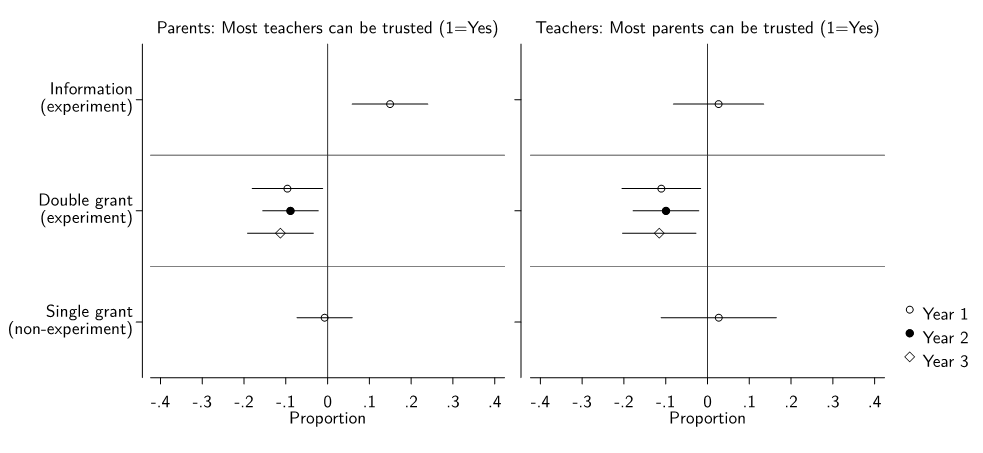 Valladolid, Mexico -Young girls in school uniform walking home after school hours. © Kertu/Shutterstock
Valladolid, Mexico -Young girls in school uniform walking home after school hours. © Kertu/Shutterstock
Low-cost, group-based information interventions can increase parental engagement in school, change parents’ behaviour at home, and improve children’s behaviour in school.
Parents play an important role in their children’s educational experiences and outcomes. But parents often face challenges when supporting their children through school. For example, schools often assume that parents are familiar with how to engage with teachers and school administrators. This assumption can lead to systematic exclusion of low-income, culturally, and linguistically diverse parents from advocating for their children’s needs and accessing school resources (Lee & Bowen 2006). To overcome the challenges that parents face, parental involvement programmes (also known as family engagement programmes) aim to improve school-and-parent communication to support children’s overall learning environment.
Experimental strategies to promote parental involvement in Mexico
In a new working paper (Barrera-Osorio et al. 2020), we study the effects of parental involvement programmes implemented at scale by the national government of Mexico. This is an important feature because studies from efficacy field trials do not always yield similar results when implemented at scale (Banerjee et al. 2017). The scaling up was made possible by delivering the programmes to parents through parent associations, an established group that exists in all public schools in Mexico.
We analyse data from two randomised controlled trials conducted across 430 public schools and over 17,500 students in Mexico. These schools have large indigenous populations that have faced a long history of discrimination. In this setting, parental involvement programmes hold particularly great promise for improving school-and-parent relationships.
We evaluate two types of parental involvement programmes. In the information intervention, parents attended group sessions where they were informed about children’s developmental milestones and ways to become involved in their children’s education. In the grant intervention, parent associations received a grant to use towards improving schools. The grant amount was modest, covering about 83% of the out-of-pocket educational costs spent by parents in our study setting. To examine how these grants affect parental involvement at the extensive and intensive margins, we examine the effects of providing a single dose of the grant (single grant) as well as the effect of doubling the grant amount (double grant).
Programme effects on parents and children
- Providing parent groups with information about how they can support their children’s education increased parental involvement in schools, changed parenting behaviour at home, and reduced children’s disciplinary action in school. The information intervention increased regular meetings between parents and teachers to discuss student performance. At home, parents that received the information intervention were significantly more likely to be aware of their children’s school assignments and to help their children with homework. Children whose parents received the information intervention were less likely to face disciplinary action in schools.
- Providing parent associations with single grants had no effects on parenting behaviour or children’s educational outcomes. Parent associations that received the single grant amount did not significantly change the behaviour of parents or their children. As the grant amount was quite modest, parent associations were not able to make meaningful changes in schools from the single dose of grant money.
- Doubling the grant amount in parent associations had a temporary effect on parental involvement in schools. The additional money provided to parent associations in the double grant intervention gave parents a temporary “seat at the table” with respect to school decision-making processes. However, the effects only lasted for one year. The double grant did not affect parenting behaviour at home or children’s educational outcomes.
- Across the different types of parental involvement interventions, there were no effects on teaching practices or on student test scores on the national standardised exam. We hypothesised that parental involvement interventions may lead to greater parental oversight over teachers in how they manage their classrooms, which in turn may induce teachers to exert greater effort. However, we did not find evidence to support this hypothesis. Given the strength of teacher unions in Mexico (Estrada 2019), there may be little incentive for teachers to directly respond to parental demands.
Trust as a key mechanism for parental involvement
What might explain the divergent results between providing information and providing grants to parent associations? Parental involvement programmes rely on the formation of successful social ties between parents and teachers to collectively support the needs of children. A large body of theoretical and empirical research suggests that trust is a core component of social capital (Putnam 2001) and the absence of trust severely hampers transactions between actors (Fehr 2009). In Figure 1, we show how each of the interventions altered trust between parents and teachers.
Figure 1. Trust between parents and teachers
Note: Points are treatment effect estimates and error bars are 95% confidence intervals.
- The information intervention enhanced parents’ trust towards teachers. In the information sessions, parents were informed about what teachers were teaching in school and how the learning objectives aligned with their children’s development. These sessions gave parents the opportunity to receive repeated positive signals about teachers, which enhanced their trust for teachers.
- The double grant reduced parents’ and teachers’ trust towards one another. The grants gave parents more financial authority over school resources. Given the flexibility in how these funds were used, the double grant intervention created “an incomplete social contract” (Ostrom 2000), whereby parents and teachers did not share common expectations about how these funds should be distributed. Thus, the institutional context surrounding the double grant intervention led to a decline in trust between teachers and parents.
Policy implications
Our results suggest that low-cost, group-based information interventions can increase parental engagement in schools, change parenting behaviour at home, and improve children’s behaviour in school. The impacts were particularly large for indigenous families, suggesting that parental involvement programmes can help improve school-family relationships for the most excluded population. The information intervention is extremely low-cost, with a per-student cost of approximately US$ 0.98.
We argue that the success of parental involvement programmes relies on the formation of social ties between parents and teachers. In particular, fostering trust between parents and teachers is important for promoting parental involvement in schools. As we saw in the double grant intervention, parental involvement programmes can backfire if institutional rules are unclear about expectations as parents attempt to increase their involvement in schools.
References
- Banerjee, A et al. (2017), From proof of concept to scalable policies: Challenges and solutions, with an application. Journal of Economic Perspectives, 31 (4), 73–102.
- Barrera-Osorio F, P Gertler, N Nakajima, & H Patrinos (2020), Promoting Parental Involvement in Schools: Evidence from Two Randomized Experiments. NBER Working Paper w28040.
- Estrada, R (2019), Rules versus discretion in public service: Teacher hiring in Mexico. Journal of Labor Economics, 37 (2), 545–579.
- Fehr, E (2009), On the economics and biology of trust. Journal of the European Economic Association, 7 (2-3), 235–266.
- Lee, J. S., & N. K. Bowen (2006), Parent involvement, cultural capital, and the achievement gap among elementary school children. American Educational Research Journal, 43 (2), 193–218.
- Ostrom, E (2000), Social capital: A fad or a fundamental concept. Social capital: A multifaceted perspective, 172 (173), 195–98.
- Putnam, R (2001), Social capital: Measurement and consequences. Canadian Journal of Policy Research, 2 (1), 41–51.
This article was first published in VoxDev.





Join the Conversation